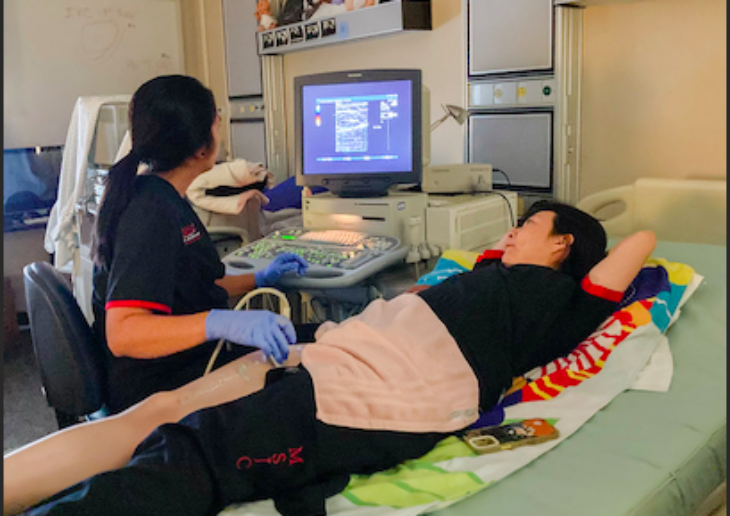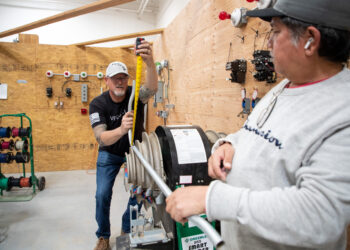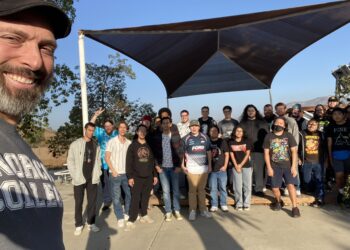MSJC’s Diagnostic Medical Sonography Program is Unrivaled

Mt. San Jacinto College’s (MSJC) Diagnostic Medical Sonography (DMS) program is unique, to
say the least. Among being one of the top DMS programs in the United States, it is also the only
DMS program in the Inland Empire within the California Community College system.
MSJC has a general Diagnostic Medical Sonography program that focuses on abdominal, small
parts, and OB/GYN. The program hopes to expand to vascular and cardiovascular specialties in
the future to provide additional career paths for its students.
The program is accredited by the Commission on Accreditation of Allied Health Education
Programs (CAAHEP) upon the recommendation of the Joint Review Commission for Diagnostic
Medical Sonography. This highly coveted accolade adds to the uniqueness of the program.
MSJC DMS Department Chair Tracy Francis said the program is held to a high standard because
of this incredible accomplishment and, as a result, students who complete the program are
highly sought-after and even desired by employers.
With the accreditation, students are eligible to take the National American Registry of
Diagnostic Medical Sonography (ARDMS) board exams 60 days prior to graduation so they can
enter the workforce immediately upon completion of the program.
“It is not unusual for students to be fully employed before they even walk the stage at
graduation,” Francis said.
According to the Occupational Information Network (ONET), diagnostic medical sonographers
make an average of $101,230 annually, with job growth projected to increase through the year
2031.
The program takes 21 months to complete, and cohorts consist of eight to ten students. The
small but mighty cohorts are due to the limited number of clinical positions. Unlike other
programs in the medical field, DMS requires a one-to-one ratio in hospital and clinical settings.
The success of the program can be attributed, in part, to both Perkins and Strong Workforce
grants that have been leveraged to provide funding to update equipment so students can learn
from the most up-to-date technology.
Strong Workforce funding has allowed the DMS program to purchase state-of-the-art
simulators called ScanTrainers, which provide students with an opportunity to learn the basic
ultrasound concepts with more than 1,000 case studies of normal and pathology findings across
multiple clinical disciplines.
ScanTrainers are a convenient way for students to practice their skills when volunteers with
specific medical conditions are hard to come by.
“The simulators allow students to get the hands-on practice they need before taking their
exams and heading into the workforce,” Francis said.
Like most college programs, the DMS program faced its own set of challenges during the
COVID-19 pandemic. The program had to transition to online for the remainder of the spring
2020 semester, bringing the critical lab hours needed for graduation to a complete halt.
With some innovative thinking, students could make up for the lost lab time during the
summer. In order to adhere to the state mandates regarding social distancing, the program had
to be creative.
“We created barriers using garment racks and plastic shower curtains. We had to cut holes in
the shower curtains for students to reach their arms through when practicing on one another,”
recalls Francis.
Despite all the challenges brought on by the pandemic, the cohort went on to be remarkably
successful. It is not uncommon for the DMS program to have a perfect or near-perfect
graduation rate. In fact, the program even had a three-year streak during which they had a
100% licensing and employment rate before the cohort even graduated.
MSJC’s DMS program has seen a steady increase in applications each year. This past year, they
set a record for most applications ever received.
For more information on MSJC’s DMS Program: www.msjc.edu/nursingandalliedhealth/dms.
PHOTOS COURTESY OF MT. SAN JACINTO COLLEGE



